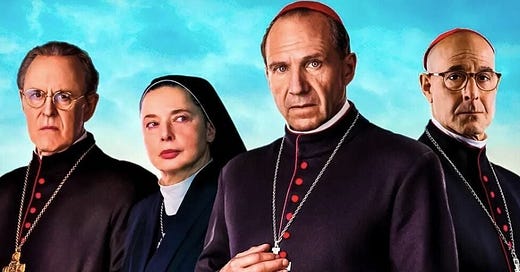Because it seemed timely, my wife and I watched Conclave on Amazon Prime the other night, the film based on the novel by Robert Harris. It’s an artfully shot, well-acted movie about a papal conclave after the death of the pope, but as you might guess it is full of intrigue, criticizes the inner workings of the Roman Catholic Church, and generally indulges the nonbeliever’s suspicions that people within organized religion are just using it as a mask for ulterior, cynical motives.
One of the more important speeches in the movie is when Ralph Fiennes character, Cardinal Thomas Lawrence, the dean of the college of cardinals, gives a homily to his fellow cardinals before the beginning of the conclave. It outlines the movie’s ideological goals, and is worth quoting in full:
My brothers and sisters, in the course of a long life in the service of our Mother the Church, let me tell you that the one sin I have come to fear more than any other is certainty. Certainty is the great enemy of unity. Certainty is the deadly enemy of tolerance. Even Christ was not certain at the end. He cried out in His agony at the ninth hour on the cross. “My God, my God, why have you forsaken me?” Our faith is a living thing precisely because it walks hand in hand with doubt. If there was only certainty, and if there was no doubt, there would be no mystery, and therefore no need for faith. . . . Let us pray that the Lord will grant us a Pope who doubts, and by his doubts continues to make the Catholic faith a living thing that may inspire the whole world. Let Him grant us a Pope who sins, and asks forgiveness, and carries on.
This is a wonderful text for discerning the spirit of our times and what our culture wants the Church to be (and also, for what it’s worth, reminds me of several prominent mainline Protestant preachers included in my seminary reading at my alma mater, but that is by the by).
If certainty here is meant to be a stand-in word for pride, then of course the Church would agree: pride has always been seen as the sin that leads to all other sins. And of course, having seasons of a kind of doubt is a normal part of a life of faith. One might expect, as a finite creature in relationship with the infinite God, that we might not perceive him correctly or constantly at every moment. To not be undone by these seasons, to press on in spite of our doubts, is spiritual wisdom as old as the book of Job.
But that’s not what’s being said here, not at all. Certainty, in the words of Cardinal Lawrence, seems to mean taking your faith seriously, taking your faith at face-value, being willing to take hard, countercultural stances when your faith demands it. Christ’s doubts, if he had them, did not prevent him from laying down his life in accordance with his Father’s will. The faith of the church is not living because of doubts, it’s living because of the power of the risen Christ which is made available to us by the Holy Spirit. The faith of the church is made alive, not through doubts, but by the faithful witnesses of Jesus. The church father Tertullian famously said that “the blood of martyrs is the seed of the church.” The church is founded upon certainty, the certainty of those who had found something or rather someone who mattered more to them than life itself.
But that’s outside of Conclave’s agenda. Certainty, according to the movie, is holding on to the parts of your faith that have gone out of style. Certainty is committing a cultural faux-pas, even though everyone around you is sure that they are “on the right side of history,” an ominous phrase if ever there was one. Certainty here is acting as if you really believe all this stuff, unaware that everyone else has been pretending all along. And it’s self-evident according to the film that certainty, embodied by the movie’s conservative villain Cardinal Tedesco, inevitably leads to being like him: racist, chauvinistic, militant, and just generally intolerable to be around.
Though the movie itself is dramatic enough to make you want to keep watching and has excellent acting and cinematography, its message is boring, predictable, and yawn-inspiring. It’s yet another paean to a secular, postmodern worldview that is crumbling as we speak. It’s yet another ode to a vision of life that fails to grasp that only people of great faith can attempt great things. Ambiguity (something literally embodied by the intersex pope chosen at the end of the movie) is the last cry of a diminished people; only the decadent and lost would be so naive as to celebrate it.
The more I think about it, the more absurd it seems. I’m grateful to have had a very charmed life, with very little suffering or loss. But in ministry I have been around many, many families and people who have gone through things I cannot imagine. Some of them were from countries and cultures who have experienced suffering on a communal scale that is beyond most Americans’ imagination. I think of my friends from the Congo who saw their family members executed in front of their eyes because of their faith; or of my Nepalese friends who saw their entire country decimated by a horrific earthquake; or of folks I know in the hollers of Eastern Kentucky who are working to proclaim the kingdom of God in a region that has been ravaged by drugs and extreme poverty. In all these cases, in whatever kind of chaos or suffering there might be, the need is not for more nuance: the need is for solid ground on which to stand. For many, but especially for the poor, certainty is no sin. It’s rather the great cry of their hearts! Certainty is the very thing they are longing for.
Imagine, to a person grieving the loss of a loved one, if the proclamation of the church was: Jesus just might be alive! But we can’t know for sure. That’s faith I guess.
Or to a person in the bonds of addiction: God, if it turns out he actually exists, probably can free you from your chains.
Or to a country in the middle of civil war: though it’s probably all just a metaphor, it’s possible that Jesus will return someday to bring justice and peace. But there are days when none of us really believe it, and you know, it hasn’t happened yet.
I think where movies like Conclave miss the mark is that certainty is only sinful if it is misplaced. To say you are certain that all your ideas about God are correct, this would be arrogance in the extreme. But to say you are certain that God is trustworthy and has made it possible to know him through scripture and through the church, this is no sin. This is choosing where to place your trust, and living out of it. Certainty in a political ideology or in a politician would be a sin, because that would be idolatry. But certainty in God, in the sense that you are trusting God above all things? This is called faith, and can only be a virtue.
The certainty which is never analyzed in the film is the certainty of the secular world, a world certain that there is no such thing as absolute truth (an absolute truth itself, which can never be questioned or the whole house of cards falls down).
The film is certain that those working within the church are mostly cynical political operatives (because to imagine or portray men of genuine faith and conspicuous holiness wouldn’t further the narrative).
The film is certain that contemporary sexual ethics are virtuous, even though we live in an age defined by sexual brokenness and confusion (something sensed even among those who are the sexual revolution’s biggest defenders).
The film is certain that our inner subjectivity, our self, is something we should trust, and the outer world, but God above all, is what we should doubt. For some this may be a liberating message. But I find it bleak, perhaps because I know how fickle and fleeting my own heart is.
The wisdom of the Bible is the exact opposite: doubt yourself, but be certain of God. This to me is much truer to life, and much more hopeful.
The film ends with Cardinal Lawrence looking out the window, seeing some nuns waltzing out the doors, away from where the cardinals have stayed for the conclave. You see them walk out of the darkness of the church, into the light of a glorious, sunny day. You hear them laughing, glad to be away from the stuffiness of the old building, away from God and his clergy, away from the old-fashioned certainties that no longer make sense for the virtuous people like us who happen to be watching the movie and who are in on its message.
Yawn. I’m not buying it. The younger generation looks to me like its running in the opposite direction, or is at least trying to. Running away from the tired cynicism of popular culture and politics, away from the crepuscular gloom of progressive religion, and into the glorious light that can only be found within the cathedrals, where people still believe in something.
Certainty, if it means absolute trust in a God who loves us, and absolute trust that he has made himself known, is not a sin. It’s the only hope for the world.
He is risen. Come, Lord Jesus, and make us certain of it.
If you enjoy my Substack, consider buying me a coffee!




![Conclave' a Surprisingly Nuanced Portrait of Catholic Church [Movie Review] - Hope 103.2 Conclave' a Surprisingly Nuanced Portrait of Catholic Church [Movie Review] - Hope 103.2](https://substackcdn.com/image/fetch/w_1456,c_limit,f_auto,q_auto:good,fl_progressive:steep/https%3A%2F%2Fsubstack-post-media.s3.amazonaws.com%2Fpublic%2Fimages%2F2b5a26a0-6dea-4cd9-b5da-31c5cb3b3890_1200x480.jpeg)

Although I have not seen this film, I thoroughly enjoyed reading your analysis of it. While I do not regularly respond to your essays, must say that I always appreciate the way you think … and your ability to communicate so clearly.
I’m certain that your grandparents (who I knew dearly) are smiling down, delighted.
Many blessings